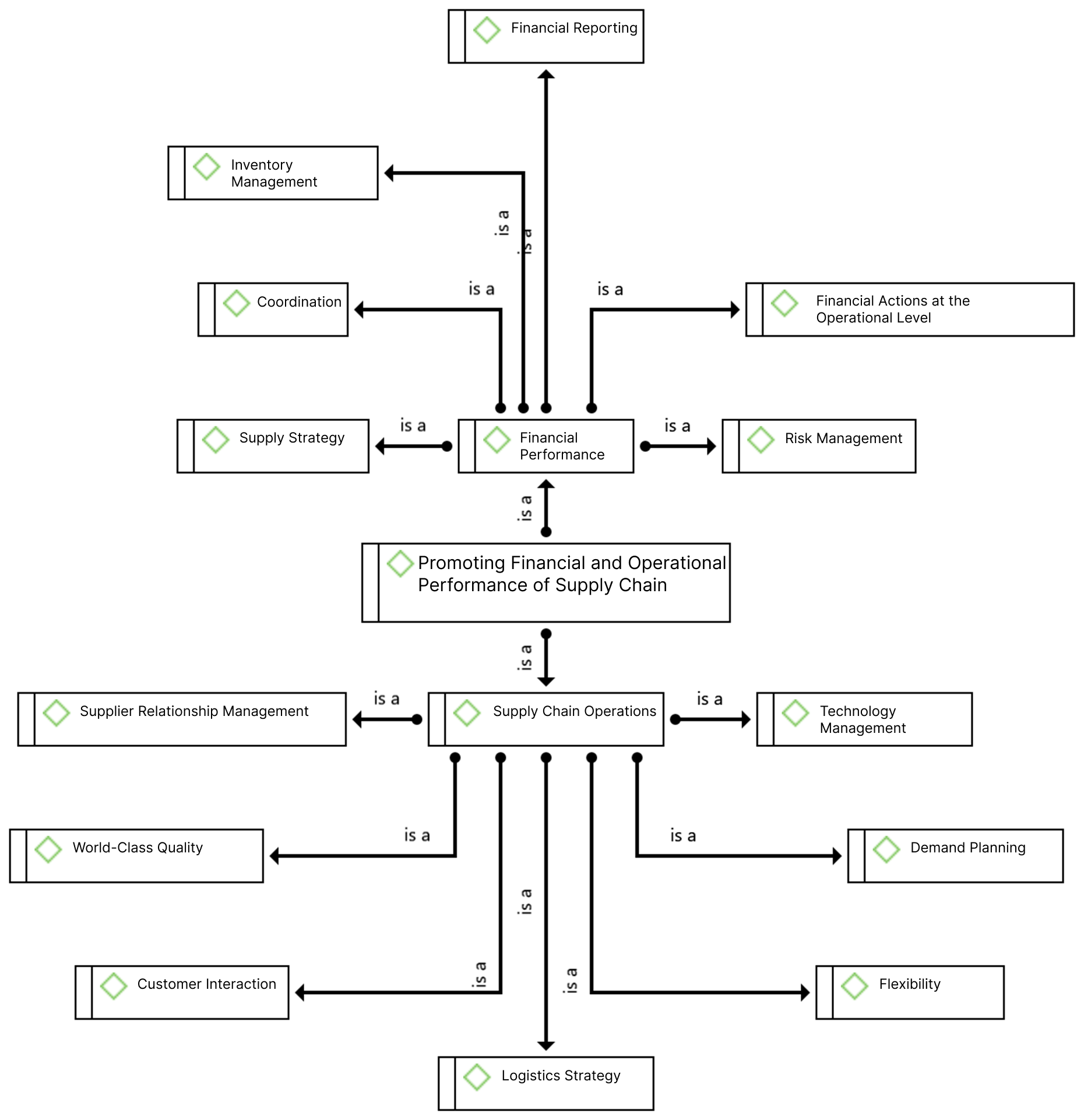Proposing a Model for Enhancing Financial and Operational Performance in Supply Chains
Keywords:
Financial performance , operational performance, supply chain, Atride SterlingAbstract
This study aims to propose a model for improving the financial and operational performance of supply chains. The participants in this study were supply chain managers with a teaching experience of at least 15 years and holding a master's degree or higher. The selection of individuals was conducted using purposive sampling based on the criterion of teaching experience at the primary educational level. A total of 22 experts and specialists participated in the sampling process. Data were collected through semi-structured interviews, which continued until theoretical saturation was reached. Thematic analysis based on the Aterid-Sterling framework was used to analyze the qualitative data. To ensure validity, several criteria were employed, including Holsti's coefficient, Cohen's kappa index, Pi-Scott coefficient, and Krippendorff’s alpha, all of which were confirmed. Thematic analysis was performed using ATLAS.ti software. The results of the thematic analysis indicate that, from the 54 indicators (themes) identified, 13 primary themes were recognized, and two major themes were derived. The identified model included two primary themes: financial performance and operational performance within the supply chain. The 13 primary themes are: inventory management, financial reporting, financial actions at the operational level, coordination, risk management, sourcing strategy, demand planning, technology management, logistics strategy, customer interaction, flexibility, supplier communication management, and world-class quality. Given the critical importance of the supply chain in organizational success, enhancing its financial and operational performance is essential and fundamental. These improvements will lead to optimizing coordination among internal and external members, efficient logistics management, and sharing financial information, ultimately resulting in increased productivity, cost reduction, and enhanced competitiveness. Moreover, identifying and managing various risks, such as price risk, supplier risk, and market risk, are key actions that help effectively address environmental challenges and opportunities.
References
H. Alizadeh and M. Jalali Filshour, "Proposing a Mixed Model of a Digital Marketing in the Financial Services Sector with an Emphasis on Artificial Intelligence Tools," in 30th National and 11th International Conference on Insurance and Development, 2023.
J. Zhang, Y. Yang, X. Liu, and J. Ma, "An Efficient Blockchain-Based Hierarchical Data Sharing for Healthcare Internet of Things," IEEE Trans. Ind. Inform., vol. 18, pp. 7139-7150, 2022, doi: 10.1109/TII.2022.3145851.
S. Negi, "A blockchain technology for improving financial flows in humanitarian supply chains: benefits and challenges," Journal of Humanitarian Logistics and Supply Chain Management, vol. ahead-of-print, 2024, doi: 10.1108/JHLSCM-10-2023-0099.
L. Soltanisehat, R. Alizadeh, H. Hao, and K. K. R. Choo, "Technical, Temporal, and Spatial Research Challenges and Opportunities in Blockchain-Based Healthcare: A Systematic Literature Review," IEEE Trans. Eng. Manag., vol. 70, pp. 353-368, 2023, doi: 10.1109/TEM.2020.3013507.
Y. Gao, A. Zhang, S. Wu, and J. Chen, "Blockchain-based multi-hop permission delegation scheme with controllable delegation depth for electronic health record sharing," High-Confidence Computing, vol. 2, p. 100084, 2022, doi: 10.1016/j.hcc.2022.100084.
G. Bansal, K. Rajgopal, V. Chamola, Z. Xiong, and D. Niyato, "Healthcare in Metaverse: A Survey on Current Metaverse Applications in Healthcare," IEEE Access, vol. 10, pp. 119914-11994, 2022, doi: 10.1109/ACCESS.2022.3219845.
S. Qahtan et al., "Novel Multi Security and Privacy Benchmarking Framework for Blockchain-Based IoT Healthcare Industry 4.0 Systems," IEEE Trans. Ind. Inform., vol. 18, pp. 6415-6423, 2022, doi: 10.1109/TII.2022.3143619.
S. Saberi, M. Kouhizadeh, and J. Sarkis, "Blockchain technology: A panacea or pariah for resources conservation and recycling," Resources, Conservation and Recycling, vol. 130, pp. 80-81, 2018, doi: 10.1016/j.resconrec.2017.11.020.
H. Alizadeh, B. Kheiri, and A. Heiydari, "An Investigation of the Brand-Consumer Relationship Model Based On Digital Marketing in the Hotel Industry," International Journal of Management, vol. 11, no. 8, pp. 1075-1093, 2020, doi: 10.34218/IJM.11.8.2020.097.
H. Alizadeh and M. Larijani, "Investigating the impact of currency risk on Bank Mellat's performance through the mediating role of financial intelligence," Scientific Journal of New Research Approaches in Management and Accounting, vol. 3, no. 8, pp. 32-47, 2018.
Q. Liu, Y. Liu, M. Luo, D. He, H. Wang, and K. K. R. C. Choo, "The Security of Blockchain-Based Medical Systems: Research Challenges and Opportunities," IEEE Syst. J., vol. 16, pp. 5741-5752, 2022, doi: 10.1109/JSYST.2022.3155156.
Y. Kumar and S. Nakamoto, "Bitcoin 6.0: Military Grade e-Payment System," SSRN Electronic Journal, 2020.
C. V. B. Murthy, M. L. Shri, S. Kadry, and S. Lim, "Blockchain based cloud computing: Architecture and research challenges," IEEE Access, vol. 8, pp. 205190-205205, 2020, doi: 10.1109/ACCESS.2020.3036812.
M. Nikoomanish, S. M. Hosseini Shokouh, and R. Zabeli, "Improving supply chain management in hospitals," in International Conference on Management and Behavioral Sciences, 2017.
V. Najafi, H. Mahbubeh, and M. Yahya Zarei, "System dynamics modeling for a sustainable hospital supply chain," in 5th International Conference on Industrial Engineering and Systems, Mashhad, Iran, 2019/09/04-05 2019.
Z. H. Sun, Z. Chen, S. Cao, and X. Ming, "Potential Requirements and Opportunities of Blockchain-Based Industrial IoT in Supply Chain: A Survey," IEEE Trans. Comput. Soc. Syst., vol. 9, pp. 1469-1483, 2022, doi: 10.1109/TCSS.2021.3129259.
S. Kamble, A. Gunasekaran, and H. Arha, "Understanding the Blockchain technology adoption in supply chains-Indian context," International Journal of Production Research, vol. 57, no. 7, pp. 2009-2033, 2019, doi: 10.1080/00207543.2018.1518610.
X. Cheng, F. Chen, D. Xie, H. Sun, and C. Huang, "Design of a Secure Medical Data Sharing Scheme Based on Blockchain," Journal of Medical Systems, vol. 44, p. 52, 2020, doi: 10.1007/s10916-019-1468-1.












